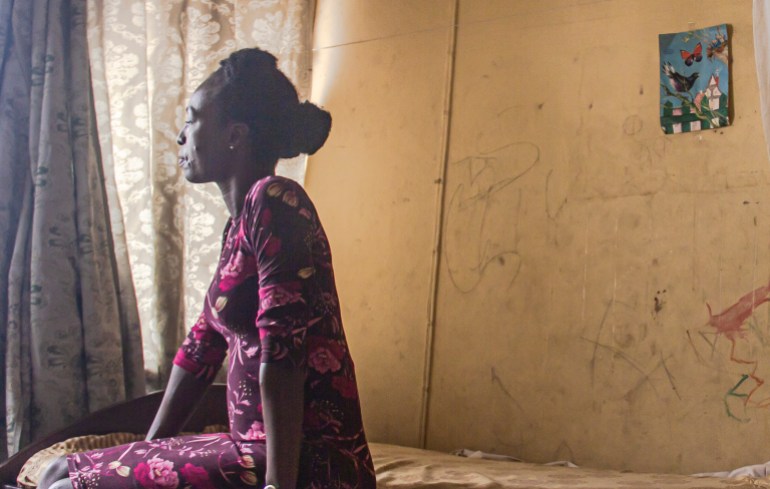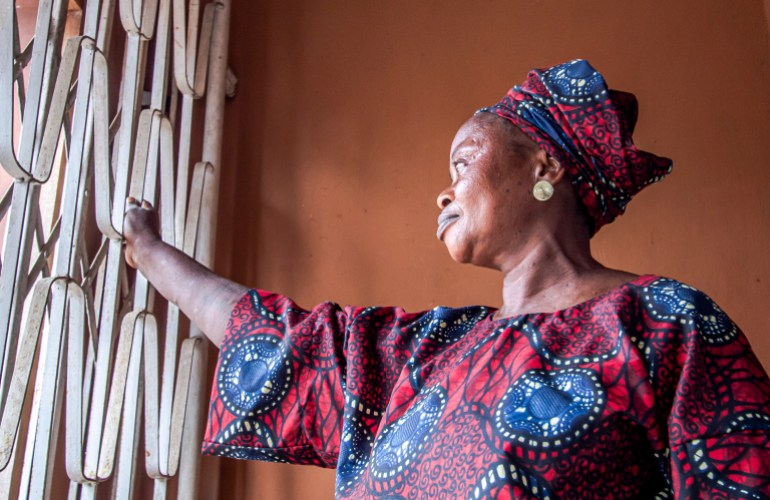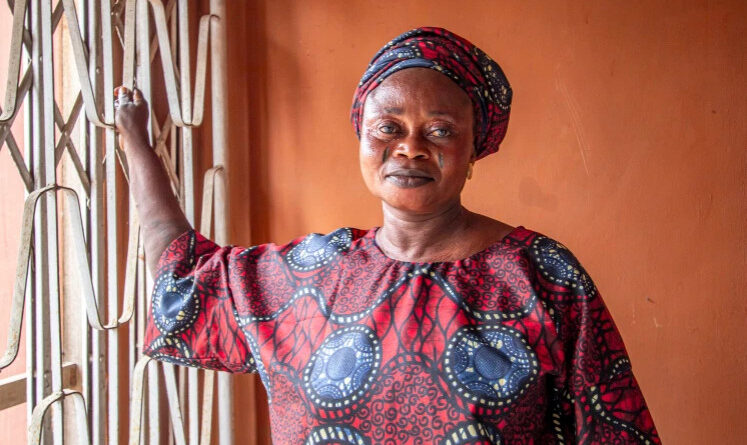Widowhood: ‘Watching My World Collapse’ The Plight of Nigeria’s Widows
In Nigeria, stories abound of widows being forced to drink the water used to wash their husband’s corpse in the belief that it will kill them if they are guilty of causing his death – or of being made to declare their innocence before a local deity.
The stigma or outright rejection, a woman who has lost her husband can face often leaves her abandoned. Superstition causes other women to believe they may lose their husbands if they associate with a widow, while some men fear they, too, will die.
Such stigmatising practices have been outlawed in Nigeria since 2015 under the Violence Against Persons Prohibition Law and are subject to a 500,000 naira ($1,220) fine or two years in prison, but so far only 23 out of Nigeria’s 36 states have formally adopted these laws into their own statutes, and cultural practices continue regardless.
Many must abide by strict traditional practices in widowhood such as cutting their hair short, wearing only dark clothes and remaining isolated at home for a period of 41 days, while others lose their property as it is claimed by their husband’s relatives.
While Nigeria’s laws of inheritance provide for women to inherit from their husbands, many defer to local, traditional practices instead. These can be deeply patriarchal. A widow’s fate, therefore, can depend entirely on the goodwill of her late husband’s family.
As the United Nations highlights International Widows’ Day today, with the theme “Invisible Women, Invisible Problems”, we shine a light on the realities of life for Yoruba widows in Ibadan, Nigeria.
 Elizabeth Adebowale, 44, was abandoned by her late husband’s family in 2012 after she refused to give in to their demands to sell the land she owned with him [Femi Amogunla/Al Jazeera]
Elizabeth Adebowale, 44, was abandoned by her late husband’s family in 2012 after she refused to give in to their demands to sell the land she owned with him [Femi Amogunla/Al Jazeera]Elizabeth Adebowale: ‘His mother became hostile to me’
When Samson Adebowale died from liver disease in July 2012 at the age of 39, he left behind his wife, Elizabeth, now 44, and two small children aged three and five.
In May 2012, Samson had complained of fever and stomach pain. Like many low-income Nigerians who wish to avoid expensive hospital tests and appointments, he first went to the local pharmacist who gave him some medication for the pain. But he did not get better.
Days later, the couple received a diagnosis at the hospital – liver disease. During the next two months, they frantically tried four different hospitals, but none of them could help him. They spent all their money on medical bills and their joint business, selling mobile phone top-up cards, suffered.
There is no universal healthcare system in Nigeria. The government does subsidise low-cost insurance policies, but even these are out of the reach of many poor people, particularly those who earn a daily wage rather than a monthly or annual salary.
In July, Samson asked his wife and two of his siblings to take him to a prayer mountain – a sacred space on a mountaintop where prayers and other religious practices take place – in the last bid for a miracle cure. He died there. Elizabeth was distraught, and her relationship with her husband’s family quickly turned sour.
“His mother became very hostile to me. She said terrible things to me; that fate had decided that I would be a widow,” says Elizabeth. She did not retaliate, she says, because of the traditional expectation that women must always be respectful to their mothers-in-law. Then, Samson’s family demanded that Elizabeth sell the couple’s land on which they had started construction work to build a new home.
Samson’s brother seized some of his other property, including some bicycles, his widow says. However, she refused to sell the land because it was all that her husband had left behind. Instead, she wanted him buried there so that their children would be able to visit his grave and still have the land as an inheritance.
She moved swiftly, asking gravediggers to dig a grave on the plot. This made it difficult for his family because there is a traditional belief among Yoruba people that once a grave is dug, the person for whom it was intended has to be buried there; not doing so could spell bad luck for the family of the deceased.
They were surprised at her refusal to give in to their demands, Elizabeth says, but ultimately they backed down. She has not heard from them since.
To support her children, she worked as an attendant at a petrol station and learned how to sew clothes and school bags. She used the income to send her children to school.
Five years after her husband’s death, she was pressured by people – particularly congregants at her church – to remarry in order to provide a father figure for her children. She did so and had another child, but the marriage only lasted two years because, she says, her second husband mistreated her.
Elizabeth believes her status as a widow enabled him to treat her badly. She left with all three children last year and is now gradually picking up the pieces of her life all over again – something made harder by the fact she has been diagnosed with heart disease.
Still, she says, she finds ways to stay happy.
“These days, I sing. I bought a secondhand keyboard and I am learning to play. Do you know that thing that they say about what does not kill you making you stronger? I have realised that I have to remain strong for my children,” Elizabeth says, smiling.
 Alice Ibitoye, 54, was widowed in 2006. Her husband’s family refused to help her unless she gave up custody of her two children aged one and four at the time, which she refused to do [Femi Amogunla/Al Jazeera]
Alice Ibitoye, 54, was widowed in 2006. Her husband’s family refused to help her unless she gave up custody of her two children aged one and four at the time, which she refused to do [Femi Amogunla/Al Jazeera]Alice Ibitoye: ‘I had to stay indoors for 41 days’
As a child, Alice Ibitoye, 54, dreamed of learning to design and sew beautiful clothes for people to wear. In June 1982, when she was just 15, however, she started suffering intense pain in her left leg and developed a fever. This condition continued on and off for 11 years before she was finally diagnosed with osteomyelitis, an infection of the bone, in her leg. The condition requires surgery, which Alice has never been able to afford.
In 1997, she met her husband, a Ghanaian taxi driver named Abdulmumin, who not only helped her to transport the goods for her business but also supported her financially once they were married.
But, in 2006, nine years into their marriage, Abdulmumin died in a car accident while driving his taxi, leaving her alone with two children, aged four and 16 months. As was required by his family’s beliefs, following his death, Alice cut her hair short and confined herself to her house for 41 days.
“If you refuse to do it, people may think that you are responsible for his death. They say, ‘Why should you be going out immediately after his death? Why should you be looking good when your husband’s body is not cold in the earth yet?’” Alice explains.
But as a daily wage earner, this made life extremely difficult for Alice and her children.
Alice asked her husband’s family for help but they refused unless she surrendered custody of her children to them. “I did not want to release my children to anyone else. I would rather raise them myself even if we are hungry,” she says.
“I have been served a quit notice by the landlord more than five times,” she says. “Once I am able to pay half of a year, the landlord tempers justice with mercy. The last one was not funny. He almost did not want to listen to my plea again.”
Alice’s children, now aged 19 and 16, cannot continue their education beyond secondary school because there is no money to pay for it. Meanwhile, her leg has worsened. The skin is scarred and pus-filled and she walks with a limp using a walking stick. The last time she visited the hospital, she was asked to pay 350,000 naira (around $850) for the surgery she requires.
“Where will I get that kind of money?” She asks.
 When Abimbola Ogundare’s husband hanged himself in 2006, she had to endure the shame and stigma associated with suicide, which is taboo in Nigeria [Femi Amogunla/Al Jazeera]
When Abimbola Ogundare’s husband hanged himself in 2006, she had to endure the shame and stigma associated with suicide, which is taboo in Nigeria [Femi Amogunla/Al Jazeera]Abimbola Ogundare: ‘His family was ashamed of his suicide’
At first, March 13, 2016, was a Sunday like any other for Abimbola Ogundare, now 44. She bathed her children, dressed them in their Sunday outfits and headed to church. Usually, her husband, Wale, would join them later on. But on this Sunday he never arrived.
The next time Abimbola saw him, he was dead. He had hanged himself. His church clothes were still on the bed, untouched. The couple had been married for 16 years and had six children. It was one of their sons who first found his father. He had nightmares for months after.
In Nigeria, suicide is taboo. It is common for people to speculate openly about whether the widow was responsible. For two years, Wale’s body remained in the mortuary: His family wanted nothing to do with his burial after they learned how he had died and Abimbola felt it would be disrespectful to bury him without their participation.
“Because of their beliefs about suicide, his family wanted him to be buried at the site of the suicide. This was not possible because it was a rented apartment. So, they left everything to me – they wanted nothing to do with it. I did everything myself. I raised the money to pay the 1,400 Naira ($3.40) weekly mortuary bill, to pay for his burial ground. Till today, they do not know where he is buried,” she laments.
Abimbola’s own health began to deteriorate after her husband’s death. “I could not sleep for days,” she says. “I started using sleeping medications just to get some hours of sleep. I was also having continuous headaches.
“I would be going out on the road and thinking I could hear him calling my name. I was also having terrible dreams.”
The family had to leave the house they were renting. “The landlord believed that his death was a bad omen and he wanted nothing to do with it,” Abimbola explains. “My neighbours were calling me mad because I would be hearing him calling my name.”
He was only buried when the Oyo state government ordered families with relatives at the mortuary to come and take them away – something that happens every so often when mortuaries become over-full.
It has now been five years since Wale’s death, and Abimbola is still struggling financially. She says there are days when they do not eat three meals and months when she has to beg at her children’s schools because she cannot afford the fees. However, her children have helped her to move on from the sadness over time.
“It is my children that make me happy. We play together. I may not have a husband but I am happy with my children. They are my husband now,” she says, smiling.
 After Folasade Johnson was widowed at the age of 26, her husband’s family seized most of his possessions as well as the earnings from the couple’s poultry business [Femi Amogunla/Al Jazeera]
After Folasade Johnson was widowed at the age of 26, her husband’s family seized most of his possessions as well as the earnings from the couple’s poultry business [Femi Amogunla/Al Jazeera]Folasade Johnson: ‘I had to start my life over again’
For 12 months after her 58-year-old husband’s death in a road accident, Folasade Johnson, then just 26, kept her hair short, dressed only in dark clothes and did not wear any makeup or jewellery. The accident, 16 years ago, nearly claimed the lives of Folasade and her 10-month-old daughter as well, but for the kindness of a passing stranger who took them both to hospital.
“It was as if I was watching my world collapse right before my eyes,” Folasade, now 42, recalls.
Then, they allowed Folosade to take a few possessions from her home before removing everything else from the rented accommodation. They just wanted her gone, she says.
Folasade had to start all over again. Unable to afford rent, she moved in with her godmother.
“With a loan from my godmother, I was able to gradually find my footing again,” she says. “Without my godmother’s kindness and that loan, it would have been really tough for me to start again.” It was this that inspired her to start the Hope Soars Foundation for Widows in Ibadan, Nigeria in 2016.
“I wanted to help women find the hope to rise again, beyond their widowhood experiences. They do not have to go through all that I went through,” she says.
Through the foundation, Folasade helps widows train in new skills as well as get medical checkups, loans and food, which she hopes should make their burdens easier to bear.
“Everything that happens happens for a reason. I think I experienced widowhood so that I could make other women’s experiences easier,” says Folasade.
 Monsurat Omobonike’s husband died at the age of 60 in 2003 when she was just 35. She struggled to put her four children through school but her son, a successful footballer, died when he was 30 [Femi Amogunla/Al Jazeera]
Monsurat Omobonike’s husband died at the age of 60 in 2003 when she was just 35. She struggled to put her four children through school but her son, a successful footballer, died when he was 30 [Femi Amogunla/Al Jazeera]Monsurat Omobonike: ‘My husband died, then my son died too’
In May 2003, when Monsurat Omobonike was 35, her husband died after suffering a stroke. A security official at Lagos Airport, Usman Abu was 60. The couple had married when Monsurat was a teenager after the early deaths of her parents left her responsible for five younger siblings at the age of 13.
Their marriage was happy, she says. “He was a very kind man who treated me and my children well. He always brought back goodies for his children from his job at the airport,” she remembers.
For the 41-day mourning period, she was secluded within the house with her four children, aged between eight and 16.
After her husband’s death, things became really difficult for the family. Her husband had been an only child, so had no siblings who could help her. Monsurat’s catering business went through a tough time when her unlicensed stall was removed from the university campus it was located at. She was forced to resort to menial jobs such as cleaning and doing laundry to survive.
“Isn’t a girl also a human being deserving of education? Look at me now, just doing small work, only to survive,” she says. “That was when I told myself that my own children must go to school, that they must have an education so that they will be better.”
Once, when things were particularly tough, she sold a plot of land to pay her daughter’s school fees. Her only son, Yusuf, was good at football and was able to make a successful career out of it.
After he secured a place with a local football club in Oyo State, he promised to support his mother. “I will buy you land. I will build you a house. I will buy you a car,” he told her. He bought the land and was paying his sisters’ school fees but then tragedy struck.
Yusuf, too, died in November 2020, after collapsing during training. His mother says she never found out what caused his death. He was 30 years old.
“His death made me remember his father’s death all over again,” Monsurat says. “It was as if I was stripped naked two times. He was my only hope; he left me hopeless.”




